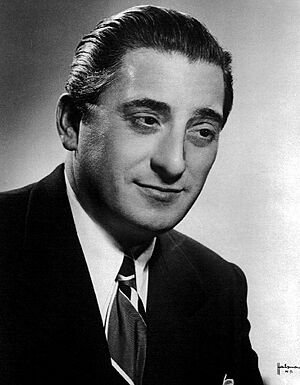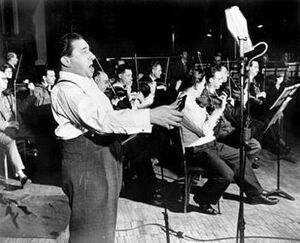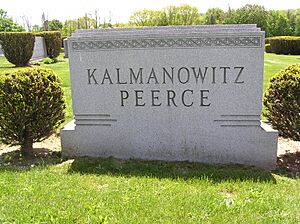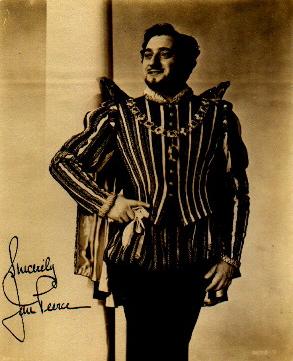Jan Peerce facts for kids
Jan Peerce (born Yehoshua Pinkhes Perelmuth; June 3, 1904 – December 15, 1984) was a famous American opera singer. He was a talented tenor, which is a male singer with a high voice. Jan Peerce performed in operas, on Broadway stages, and gave many solo concerts. He also made many recordings. He was the father of film director Larry Peerce.
Contents
Early Life and Family
Jan Peerce was born Jacob Pincus Perelmuth in New York City. His family was Jewish, and his parents, Louis and Henya Perelmuth, came from a village called Horodetz. This village was in Poland, but it is now part of Belarus.
Jacob was born on June 3, 1904, in a small apartment in Manhattan. His friends called him "Pinky." When he was young, his older brother Mottel died in an accident. Jacob went to DeWitt Clinton High School and Columbia University. His mother encouraged him to take violin lessons. He became good at playing the violin and performed in dance bands. He was known as Jack "Pinky" Pearl. Sometimes, he would also sing, and people soon realized he had an amazing singing voice.
In 1930, Jan married Alice Kalmanovitz, a friend from his childhood. They were married for 54 years. Jan Peerce was also the brother-in-law of another famous American tenor, Richard Tucker. Richard Tucker married Jan's only sister, Sara, in 1936. Jan Peerce passed away at his home in New Rochelle, New York, on December 15, 1984, when he was 80 years old. He is buried in Mount Eden Cemetery in Valhalla, New York.
Singing Career
Jan Peerce studied singing in New York City with Giuseppe Boghetti. In 1932, he started working as a tenor soloist at the Radio City Music Hall. The director, Roxy, gave him the name John Pierce. They later agreed on the name Jan Peerce, which the singer felt better suited his background. Soon, many people across the country knew him from his radio shows and stage performances.
Working with Arturo Toscanini
A famous conductor named Arturo Toscanini heard Peerce singing on the radio. Toscanini was looking for a tenor to sing with his NBC Symphony Orchestra. He contacted Peerce, who then auditioned for him. Toscanini was very impressed. He found Peerce to be the perfect tenor for his opera and choir performances.
The recordings they made together are considered very important musical works from the mid-1900s. Toscanini liked Peerce's professional attitude and his musical talent. He also liked that Peerce spoke Italian very well. Many people said Peerce was Toscanini's "favorite tenor." Peerce said that Toscanini never got angry with him, even though he was known for getting angry with other musicians. Peerce first sang with Toscanini on February 6, 1938, in Carnegie Hall. They performed Beethoven's Ninth Symphony.
Opera Debuts
In 1938, Peerce joined the Philadelphia La Scala Opera Company. He made his first professional opera appearance on December 10, 1938. He played the Duke of Mantua in Verdi's Rigoletto. He also sang Alfredo in La traviata and Pinkerton in Puccini's Madama Butterfly.
In November 1939, Peerce gave his first solo concert in New York City. He made his debut at the famous Metropolitan Opera on November 29, 1941. He sang Alfredo in Verdi's La traviata. He also performed as Cavaradossi in Puccini's Tosca, Rodolfo in La bohème, and in Gounod's Faust. Critics praised him as a great American opera singer.
Later Performances
In December 1943, Peerce appeared in a film called Hymn of the Nations. In this film, he performed with Toscanini and the NBC Symphony Orchestra. During the 1950s, Peerce often sang as a featured soloist at the Lewisohn Stadium in New York City. Over 14,000 people would attend these "Italian Night" concerts. He performed with the New York Philharmonic and other famous singers.
In 1956, Peerce visited Moscow as a "cultural exchange" ambassador. He was the first American to sing with the famous Bolshoi Opera. He continued to perform at the Metropolitan Opera until 1966. In 1971, he made his Broadway debut. He played Tevye in the musical Fiddler on the Roof.
Peerce continued to perform occasionally until he retired in 1982. His voice remained strong and beautiful. His last concert was on May 2, 1982, in Dayton, Ohio.
Recordings
Jan Peerce made his first recordings in 1931 and 1932. He sang with dance bands in New York, using the names "Jack Pearl" and "Pinky Pearl." These early recordings included popular songs like "Snuggled on Your Shoulder."
Peerce recorded mostly for RCA Victor from the late 1930s to the early 1960s. He was a "Red Seal" artist, which meant he recorded classical music. He sang in Toscanini's 1944 performance of Beethoven's Fidelio. He also recorded complete operas like Verdi's La traviata and Puccini's La bohème.
He recorded Verdi's Rigoletto in 1950 and Bizet's Carmen in 1951. He also recorded Donizetti's Lucia di Lammermoor in 1957. Many of his live performances from the Metropolitan Opera were also released as recordings. Later, Peerce recorded several operas and oratorios for Vanguard Records.
His most popular song recording was "Bluebird of Happiness" from 1945. It became his signature song. He recorded it three times for RCA Victor. This song was one of the best-selling recordings by opera and concert singers for a long time. Peerce even named his 1976 autobiography The Bluebird of Happiness: The Memoirs of Jan Peerce.
Film Appearances
Jan Peerce appeared in a few films. In the 1947 movie Something in the Wind, he played a jailer named Tony. He sang a duet from the opera Il trovatore with the film's star, Deanna Durbin. In 1953, his voice was used for the tenor character Gregory Lawrence in the film “Tonight We Sing.” In 1969, his son Larry Peerce, who was a director, cast his father and his uncles in a scene for the movie “Goodbye Columbus.”
Images for kids






